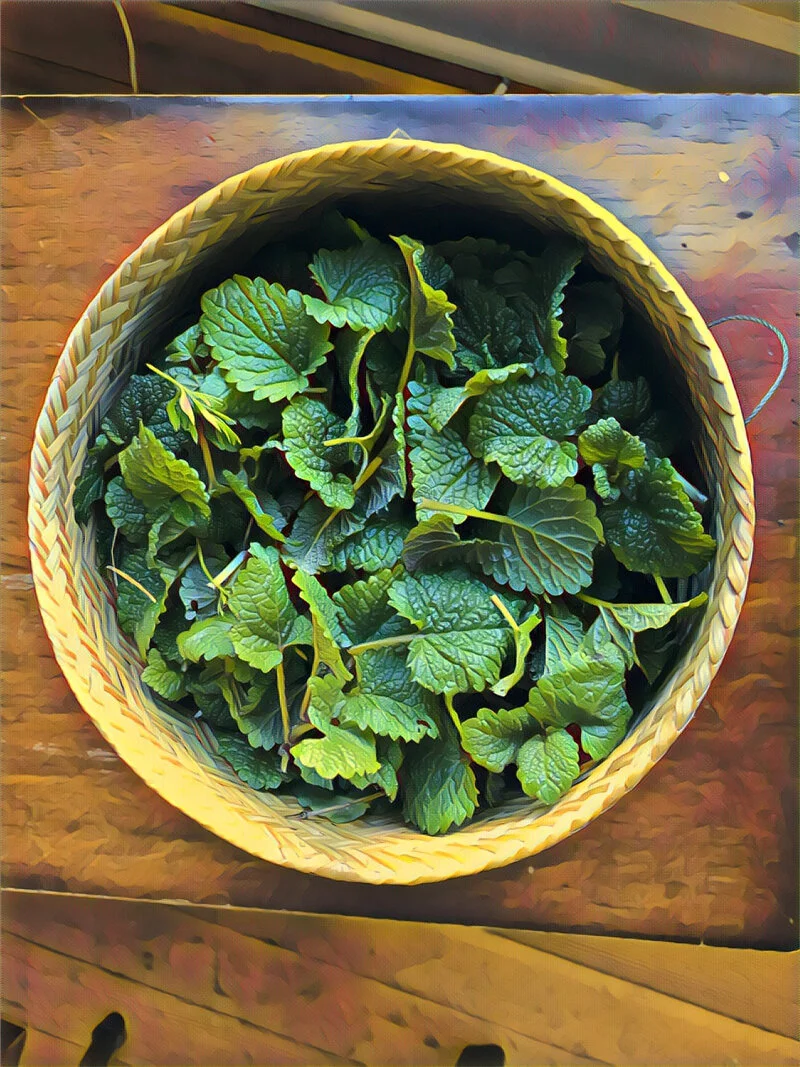Lemon Balm
What is it about this small little weedy herb that makes people delight and kind of freak out? I’d like to think its because its one of the friendliest, most easy and versatile herbs out there. If it pops up in your garden you will have a hell of a time eradicating it. It just wants to grow and spread and take over and for herbalists thats mainly fine. You can throw it in teas, make it into a useful tincture, infuse it in honey, add it to cordials, steam them for respiratorry conditions, throw a few leaves in salads and make it into a wonderful hydrosol for cleaning, skin care and as a room freshener.
This is one of those herbs that you can give to children in tea form with a bit of honey and they will almost always love it. And if they play with it in the yard and then have a cup of lemon balm tea you may find a budding herbalist in the house. Lemon Balm’s latin name is Melissa officinalis and this mint family plant original hales from Europe but has found its way to North America and many other parts of the world. Melissa is the Greek word for honey bee and indeed bees are attracted to its small white flowers. Growing up to a couple feet tall, this perennial spreads by rhizome to truly take over patches of your yard.
This is one of our premier “nervine” herbs- a term for plants that have a marked effect on the nervous system. You can read about nervine herbs in this article that I wrote here. Lemon balm is a gentle aromatic relaxant that has a nice effect on the digestive system by improving gut motility and reducing cramping, bloating and tummy distress. This makes it a favorite for mothers with a upset child with tummy problems. A glycerite or a bit of tea with honey can usually trick to settle the nerves and the digestion.
Though its acts a calming nervine, like other lemony herbs, it seems to add a touch of joy, gladdens the heart and helps us to release frustration and stagnant thinking patterns. It won’t tranquilize like kava or valerian but simply give us a bit of comfort and joy. Lemon balm cools. That means its wonderful for hot conditions such as fevers and inflammation, and works to soothe people who appear overheated, angry, anxious and “keyed up”. It can help with nervous system overload, heart palpitations, high blood pressure and insomnia.
A couple other tidbits about this plant. Melissa is a wonderful anti-viral and is useful externally an internally for herpes, shingles and other viral attacks. Melissa is also a specific for hyperthyroidism, helping to calm an overstimulated thyroid. There has been some discussion over whether it is contraindicated for those with hypothyroidism but most good herbalists I know have not seen a poor reaction.
Let’s take a look at the energetics of this wonderful herb:
Latin Name: Melissa officinalis
Family: Lamiaceae (Mint Family)
Parts Used: Leaves, flowers
Taste/Energetics: Sour, slightly sweet. cooling
Properties: Anxiolytic, anti-depressant,. anti-spasmodic, carminative, anti-inflammatory, anti-microbial, diaphoretic
Actions
1- Gentle nervine relaxant for anxiety, insomnia, panic attacks
2- Antispasmodic for cramps, tightness, spasms, griping stomach
3- Uplifting and “cheery” herb that lifts the spirits, improves mood
4- Reduces heart palpitations
5- For cold sores, viral infections such as herpes and shingles.
6- At onset of colds to open the pores and help sweat
Mental Health Signs: This is for people who appear wound up, anxious, overheated, stressed out and frazzled- often with heat signs such as flushing, skin eruptions.
Contraindications: Some would suggest avoiding with hypothyroid condition but no herbalist I know has seen signs of poor reactions in hypothyroid clients who consume lemon balm. Nonetheless it would be prudent to avoid this herb in large amounts of those with hypothyroidism/Hashimotos.
Make
Gather handfuls of the fresh herb and chop up immediately. Dry for a week and then place in glass jars for later use. Use fresh herb for a variety of preparations.
Tincture- Take fresh leaves and chop finely. Then add to pint mason jar to the top loosely. Add 60 % alcohol to the top and allow for 1/2 to one inch of space at top. (The water content of lemon balm will drop the final ETOH level considerably.) Store in dark place, shake daily and strain at 4 weeks. 2-3 ml to 3x/day
Salve- Fill a pint mason jar loosely up with lemon balm and then pour olive oil or fractionated coconut oil to the top. There should be about 1/2 to one inch of space above leaves. Allow top infuse for 2 weeks in a sunny spot in the house. Then strain. In a double boiler add 8 ounces (one cup of lemon balm oil) to one ounce of grated beeswax. Allow to dissolve then pour salve into tin jars and allow to cool. The salve will harden up and is great for cold sores, rashes, and shingles attacks.
Tea: 1 tablespoon dried (2 tbsp fresh) chopped lemon balm to one cup of hot water, simmered with lid on for 10 minutes. Strain and drink.
Lemon Balm Gin Cocktail
1 pint of water
1 large handful of lemon balm leaves (de-stemmed and chopped- about a cup)
1 cup of sugar
1 ounce gin
A few leaves of lemon balm.
Bring pint of water to a boil and then add sugar and stir to dissolve. Then add leaves and turn heat off and allow to steep for 20 minutes. (You can also play with this and add other aromatics, lemon juice etc). Then strain. You now have a lemon balm syrup. Refrigerate.
Now pour an ounce of gin and add a teaspoon of the lemon balm syrup and a twist of lemon.
Lemon Balm Honey Vodka
1/4 cup water
1 pint vodka
1/4 cup honey
1 handful of fresh lemon balm leaves- destemmed and chopped (about a cup)
1 tbsp fresh squeezed lemon juice
Take vodka and water and warm gently on the stove (do not boil) and then drizzle in honey and stir until dissolved. Add to quart jar and fill with lemon juice and lemon balm to an inch below the top of the liquid. Cap and allow to sit for 30 minutes. Strain and serve.
Lemon Balm Syrup- (for children)
3/4 pint (12 ounces) of water
1 heaping cup of fresh lemon balm.
1/2 cup of honey.
Place water in a pan and bring to a simmer and then turn off heat, add lemon balm leaves and put a lid on it. Allow to steep 20 minutes. Then strain. Remove from stove and allow to cool until tea is just warm. Then add honey and stir in until dissolved. Place in a pint jar and store in the fridge. For children offer a tablespoons of this syrup for anxiety, upset tummies and challenges with nighttime routine. If this is for adults, you can add an ounce of lemon balm tincture for longer preservation.
Salads
Simply add a few young springs to the salad. Make up a vinaigrette by adding 2 ounces olive oil to one ounce red wine vinegar and a tinch of honey and a tinch of salt. Add a tablespoon of fresh chopped garden aromatic herbs if you desire. Place in blender and blend until smooth. Drizzle over salad.
This article written by Jon Keyes, Licensed Professional Counselor and herbalist. For more articles like this, please go to www.Hearthsidehealing.com. You can also find me at the Facebook group Herbs for Mental Health.












